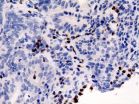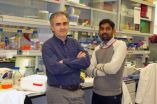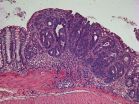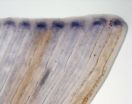(Press-News.org) Barcelona, Thursday 27 March 2014.- A team headed by Angel R. Nebreda at the Institute for Research in Biomedicine (IRB) identifies a dual role of the p38 protein in colon cancer. The study demonstrates that, on the one hand, p38 is important for the optimal maintenance of the epithelial barrier that protects the intestine against toxic agents, thus contributing to decreased tumour development. Intriguingly, on the other hand, once a tumour has formed, p38 is required for the survival and proliferation of colon cancer cells, thus favouring tumour growth. The study is published today in Cancer Cell, a journal with one of the highest impact factors in cancer research.
p38 enhances the survival of colon cancer cells
The protein p38 is a member of the MAPK family—molecules that transmit signals from outside the cell inside, thus allowing an appropriate and dynamic cell response. This protein is expressed in all cells of the body and it performs highly diverse functions depending on the context and tissue involved. Nebreda's group at IRB focuses on the function of p38 in cancer. Their work describes the essential role of p38 in tumour progression for the first time in vivo. Furthermore, the scientists demonstrate that the treatment of mice with a p38 inhibitor previously used in clinical assays causes a considerable reduction in tumour size. The study provides useful information for clinicians and pharmaceutical companies about the role of p38 in the context of colon cancer. Colorectal cancer is now the second leading cause of cancer-related death in the world.
"p38 inhibitors may have clinical applications, but probably—and this forms part of the medicine of the future—these will be in combination with other drugs. We are trying to find out what p38 inhibitors should be combined with to make the tumour, which is now smaller, finally disappear," explains the Spanish scientist Nebreda, head of the Signalling and Cell Cycle Lab at IRB, BBVA Foundation Cancer Research Professor and ICREA research professor.
p38 suppresses pre-tumoral stages characterized by colon inflammation
The role of p38 in cancer is not clear cut. In this same study, Indian-born Jalaj Gupta who recently obtained his PhD in Nebreda's lab and is first author of the work, demonstrates that this same protein in a pre-tumoral context, favoured by inflammation of the colon—also known as colitis—impedes tumour development. It is well-known that patients with chronic inflammation of the intestine, such as that caused by Crohn's disease, have a greater incidence of colon tumours that the healthy population. In order to study the relationship between inflammation and cancer, Nebreda's team use mouse models that reproduce this inflammatory context. "Given that p38 regulates inflammation and also functions as a tumour suppressor in some mouse models, our study addressed how these two functions are integrated during the colon tumorigenesis associated with inflammation", says Gupta.
An important finding of the present study is related to the contribution of p38 to the maintenance of an intact epithelial barrier, a structure that protects the intestine from toxic agents and pathogens. Mice genetically depleted of p38 in the epithelial cells that form the intestinal barrier were subjected to a cancer-inducing protocol that causes mutations and inflammation. These animals developed twice as many tumours as a group of p38-expressing mice subjected to the same protocol. The tumour-suppressing capacity of p38 has also been described in cancer of the liver and lung. "Our study highlights the complexity of p38 functions, both in cancer and in the normal maintenance of tissues, and shows why an inhibitor of this molecule could effectively have undesirable side effects. This is why it is necessary to study in depth the patients and contexts in which treatment with such inhibitors would be suitable," explains Gupta.
"All drugs currently used to treat cancer have side effects," states Nebreda, "and in this regard p38 inhibitors would be no exception. However, the administration of such inhibitors to colon cancer patients may be a useful strategy to shrink the tumour in a few days before its surgical removal". Nebreda goes on to explain that the basic research performed in his lab seeks to understand better the biology of tumour cells, the roles of the molecules involved and the mechanisms that allow tumour progression. "We try to take this basic information a step further so that it becomes clinically useful when designing new treatments," says the researcher, who joined IRB, in Barcelona, in 2010, after working in USA, UK, Germany and the CNIO in Madrid.
In collaboration with a team led by Manuel Hidalgo at the CNIO, Nebreda's group is now studying mice implanted with tumours taken from patients. The preliminary results confirm the relevance of p38 for the growth of human tumours. The researchers also have experiments underway to study the involvement of p38 in the progression of breast and lung tumours.
INFORMATION:
Published today in the online advanced edition of Cancer Cell and involving the participation of Vassilis Gorgoulis' group at the University of Athens, the study was started six years ago as part of the European project InflaCare, which addressed the relationship between inflammation and cancer. The study has been completed with funding from the Spanish Ministry of Economy and Competitiveness, and from an ERC Advanced Grant project awarded to Nebreda in 2012 by the European Research Council. Forthcoming research will be performed as part of the latter, which will be completed in 2017. The competitiveness of Nebreda's group at IRB is strengthened by structural funding given to the lab by the BBVA Foundation since 2011, when Nebreda was appointed a BBVA Foundation Cancer Research Professor.
Reference article:
Dual function of p38alpha MAPK in colon cancer: suppression of colitis-associated tumor initiation but requirement for cancer cell survival
Jalaj Gupta, Ivan del Barco Barrantes, Ana Igea, Stratigoula Sakellariou, Ioannis S. Pateras, Vassilis G. Gorgoulis and Angel R. Nebreda
Cancer Cell (2014) http://dx.doi.org/10.1016/j.ccr.2014.02.019
More information:
Sònia Armengou
IRB Press Officer
+ 34 93 403 72 55/ +34 618 294 070
armengou@irbbarcelona.org
ABOUT THE INSTITUTE FOR RESEARCH IN BIOMEDICINE (IRB BARCELONA)
Founded in 2005 by the Government of Catalonia and the University of Barcelona, the Institute for Research in Biomedicine (IRB) is one of eight centres in Spain to be first recognised by the Ministry of Economy and Competitiveness as a "Severo Ochoa Centre of Excellence". The 23 groups hosted by the institute are devoted to basic and applied research at the interface between molecular and cellular biology, structural and computational biology, and chemistry, with experts in proteomics, genomics, biostatistics, and advanced digital microscopy. The research at IRB Barcelona is organised into five programmes, which work together with the common goal of conducting multidisciplinary projects that address important biomedical problems affecting our society, with special emphasis on cancer and metastasis. The institute is home to approximately 440 employees from 38 countries. IRB Barcelona's ultimate objective is to translate research results to the clinic and has already established three biotechnology spin-off companies to this end. The institute is located in the Barcelona Science Park (PCB), in the Diagonal Campus of the University of Barcelona. Director: Dr. Joan J. Guinovart. http://www.irbbarcelona.org /@IRBBarcelona / http://www.facebook.com/irbbarcelona
Researchers at IRB discover a key regulator of colon cancer
2014-03-27
ELSE PRESS RELEASES FROM THIS DATE:
Researchers: Biomarkers predict effectiveness of radiation treatments for cancer
2014-03-27
An international team of researchers, led by Beaumont Health System's Jan Akervall, M.D., Ph.D., looked at biomarkers to determine the effectiveness of radiation treatments for patients with squamous cell cancer of the head and neck. They identified two markers that were good at predicting a patient's resistance to radiation therapy. Their findings were published in the February issue of the European Journal of Cancer.
Explains Dr. Akervall, co-director, Head and Neck Cancer Multidisciplinary Clinic, Beaumont Hospital, Royal Oak, and clinical director of Beaumont's BioBank, ...
Cancer researchers find key protein link
2014-03-27
HOUSTON – (March 27, 2014) – A new understanding of proteins at the nexus of a cell's decision to survive or die has implications for researchers who study cancer and age-related diseases, according to biophysicists at the Rice University-based Center for Theoretical Biological Physics (CTBP).
Experiments and computer analysis of two key proteins revealed a previously unknown binding interface that could be addressed by medication. Results of the research appear this week in an open-source paper in the Proceedings of the National Academy of Sciences.
The proteins ...
Sleep may stop chronic pain sufferers from becoming 'zombies'
2014-03-27
Chronic pain sufferers could be kept physically active by improving the quality of their sleep, new research suggests.
The study by the University of Warwick's Department of Psychology, published in PLoS One, found that sleep was a worthy target for treating chronic pain and not only as an answer to pain-related insomnia.
"Engaging in physical activity is a key treatment process in pain management. Very often, clinicians would prescribe exercise classes, physiotherapy, walking and cycling programmes as part of the treatment, but who would like to engage in these activities ...
First sightings of solar flare phenomena confirm 3-D models of space weather
2014-03-27
Scientists have for the first time witnessed the mechanism behind explosive energy releases in the Sun's atmosphere, confirming new theories about how solar flares are created.
New footage put together by an international team led by University of Cambridge researchers shows how entangled magnetic field lines looping from the Sun's surface slip around each other and lead to an eruption 35 times the size of the Earth and an explosive release of magnetic energy into space.
The discoveries of a gigantic energy build-up bring us a step closer to predicting when and where ...
Corporate layoff strategies are increasing workplace gender and racial inequality
2014-03-27
Research from Prof. Alexandra Kalev of Tel Aviv University's Department of Sociology and Anthropology reveals that current workplace downsizing policies are reducing managerial diversity and increasing racial and gender inequalities. According to the study, layoff practices focusing on positions and tenure, rather than worker performance, minimized the share of white women in management positions by 25 percent and of black men by 20 percent. Prof. Kalev found that a striking two-thirds of the companies surveyed used tenure or position as their core criteria for downsizing. ...
Instituting a culture of professionalism
2014-03-27
Boston, MA—There is a growing recognition that in health care institutions where professionalism is not embraced and expectations of acceptable behaviors are not clear and enforced, an increase in medical errors and adverse events and a deterioration in safe working conditions can occur. In 2008 Brigham and Women's Hospital (BWH) created the Center for Professionalism and Peer Support (CPPS) and has seen tremendous success in this initiative. Researchers recently analyzed data from the CPPS from 2010 through 2013 and found that employees continue to turn to the center for ...
Controlling electron spins by light
2014-03-27
This news release is available in German.
The material class of topological insulators has been discovered a few years ago and displays amazing properties: In their inside, they behave electrically insulating but at their surface they form metallic, conducting states. The electron spin, i. e., their intrinsic angular momentum, is playing a decisive role. Their sense of rotation is directly coupled to their direction of movement. This coupling leads not only to a high stability of the metallic property but also enables a particularly lossless electrical conduction. ...
To grow or not to grow: a step forward in adult vertebrate tissue regeneration
2014-03-27
The reason why some animals can regenerate tissues after severe organ loss or amputation while others, such as humans, cannot renew some structures has always intrigued scientists. In a study now published in PLOS ONE*, a research group from Instituto Gulbenkian de Ciência (IGC, Portugal) led by Joaquín Rodríguez León provided new clues to solve this central question by investigating regeneration in an adult vertebrate model: the zebrafish. It was known that zebrafish is able to regenerate organs, and that electrical currents may play a role in this process, but the exact ...
Seasonal Arctic summer ice extent still hard to forecast, study says
2014-03-27
Scientists at the National Snow and Ice Data Centre (NSIDC), University College London, University of New Hampshire and University of Washington analysed 300 summer Arctic sea ice forecasts from 2008 to 2013 and found that forecasts are quite accurate when sea ice conditions are close to the downward trend that has been observed in Arctic sea ice for the last 30 years. However, forecasts are not so accurate when sea ice conditions are unusually higher or lower compared to this trend.
"We found that in years when the sea ice extent departed strongly from the trend, such ...
Four in 10 infants lack strong parental attachments
2014-03-27
PRINCETON, N.J.—In a study of 14,000 U.S. children, 40 percent lack strong emotional bonds — what psychologists call "secure attachment" — with their parents that are crucial to success later in life, according to a new report. The researchers found that these children are more likely to face educational and behavioral problems.
In a report published by Sutton Trust, a London-based institute that has published more than 140 research papers on education and social mobility, researchers from Princeton University, Columbia University, the London School of Economics and Political ...







